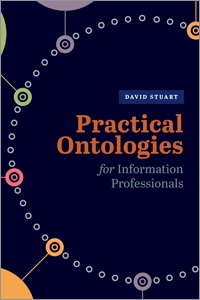
Practical Ontologies for Information Professionals
Customers outside of North America (USA and Canada) should contact Facet Publishing for purchasing information.
Primary tabs
You don't need to be an ALA Member to purchase from the ALA Store, but you'll be asked to create an online account/profile during checkout to proceed. This Web Account is for both Members and non-Members. Note that your ALA Member discount will be applied at the final step of the checkout process.
If you are Tax-Exempt, please verify that your account is currently set up as exempt before placing your order, as our new fulfillment center will need current documentation. Learn how to verify here.
- Description
- Table of Contents
- About the author
- Reviews
More data and information is being created than ever before. Ontologies, formal representations of knowledge with rich semantic relationships, have become increasingly important in the context of today's information overload and data deluge. The publishing and sharing of explicit explanations for a wide variety of concepts, in a machine readable format, has the power to both improve information retrieval and discover new knowledge. Information professionals are key contributors to the development of new, and increasingly useful, ontologies.
Practical Ontologies for Information Professionals provides an accessible introduction to the following:
- defining the concept of ontologies and why they are increasingly important to information professionals;
- ontologies and the Semantic Web;
- existing ontologies, such as RDF, RDFS, SKOS, and OWL2;
- adopting and building ontologies, showing how to avoid repetition of work and how to build a simple ontology;
- interrogating ontologies for reuse; and
- the future of ontologies and the role of the information professional in their development and use.
1. What is an ontology?
- Introduction
- The data deluge and information overload
- Defining terms
- Knowledge organization systems and ontologies
- Ontologies, metadata and linked data
- What can an ontology do?
- Ontologies and information professionals
- Alternatives to ontologies
- The aims of this book
- The structure of this book
2. Ontologies and the semantic web
- Introduction
- The semantic web and linked data
- Resource description framework (RDF)
- Classes, subclasses and properties
- The semantic web stack
- Embedded RDF
- Alternative semantic visions
- Libraries and the semantic web
- Other cultural heritage institutions and the semantic web
- Other organizations and the semantic web
- Conclusion
3. Existing ontologies
- Introduction
- Ontology documentation
- Ontologies for representing ontologies
- Ontologies for libraries
- Upper ontologies
- Basic formal ontology
- Cultural heritage data models
- Ontologies for the web
- Conclusion
4. Adopting ontologies
- Introduction
- Reusing ontologies: application profiles and data models
- Identifying ontologies
- The ideal ontology discovery tool
- Selection criteria
- Conclusion
5. Building ontologies
- Introduction
- Approaches to building an ontology
- The twelve steps
- Ontology development example: Bibliometric Metrics Ontology element set
- Conclusion
6. Interrogating ontologies
- Introduction
- Interrogating ontologies for reuse
- Interrogating a knowledge base
- Understanding ontology use
- Conclusion
7. The future of ontologies and the information professional
- Introduction
- The future of ontologies for knowledge discovery
- The future role of library and information professionals
- The practical development of ontologies
- Conclusion
Bibliography
David Stuart
David Stuart is an independent information professional, Bibliometrics Officer at the University of St. Andrews and an Honorary Research Fellow at the University of Wolverhampton. He has published widely in peer-reviewed academic journals and professional journals on information science, metrics, and semantic web technologies and is author of a number of books, including Practical Ontologies for Information Professionals (2016), Facilitating Access to the Web of Data (2011) and Practical Data Science for Information Professionals (2020).
”A sound introduction."
— Library Journal
”Offers insight into the evolution of classification of digital data and knowledge. This book will be useful to archivists, domain experts, LIS students, and library and information professionals. Recommended."
— ARBA
”Stuart’s book is a useful introduction to ontologies for librarians and other information professionals who know little about them."
— Catholic Library World
”A worthwhile addition to any library information science professional development collection."
— Technicalities


